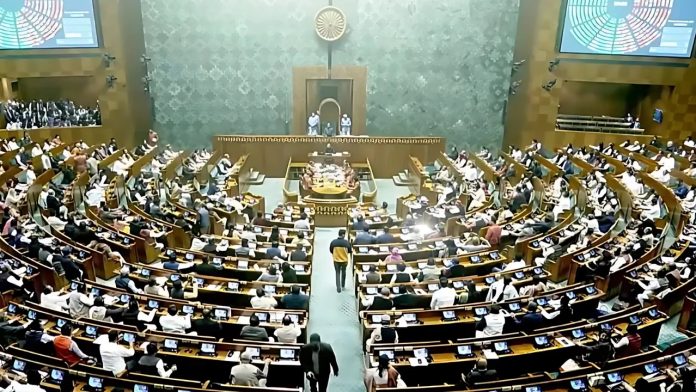By Kalyani Shankar
Parliament’s productivity in the just-concluded Winter Session was a record low – only 52 percent of scheduled work completed. Various factors, including disruptions and lack of quorum, contributed to the reduced output. The confrontation between the treasury benches and a belligerent Opposition continued throughout. The current performance highlights the challenges in maintaining productivity.
The Opposition wanted to discuss the Adani issue and Leader of Opposition Rahul Gandhi has been raising the issue in public. It is a matter of significant public interest due to its implications. Also, the Opposition asked Union Home Minister Amit Shah to apologize for his comments about Dr B.R. Ambedkar, a highly respected figure in Indian history. The government was not willing to be flexible.
With a productivity of merely 40.03 percent in the Winter Session, the Lok Sabha passed four of the five bills it received. Rajya Sabha approved three bills. The Lok Sabha lost 65 hours and 15 minutes, the highest in 2024. Many requests for adjournment motions made in Lok Sabha and Rajya Sabha were not accepted.
The 18th Lok Sabha is different in many respects. For the first time in a decade, there’s a strong opposition with an official leader of Opposition (LOP) but the bitterness between parties within and outside Parliament is increasing. Neither side is willing to accommodate. Discipline, decorum and dignity of Parliament are of paramount importance. The pressing need for parliamentary reforms is more evident than ever, and action is needed now.
Over Rs 97,87,50,000 of taxpayers’ money was spent during the Winter Session. The cost of running a Parliament session is over Rs 2.5 lakh per minute, a considerable burden on the exchequer, which should prompt reevaluating our parliamentary practices. The Parliament’s high cost and low productivity must be addressed sooner or later. House is often adjourned many times a day. In the last five decades, it has increased by over 100 times. This underlines the need to address the issue.
For instance, Parliament saw protests from the ruling BJP-led NDA and the aggressive Opposition INDIA Bloc. BJP MPs accused the Congress party of “insulting” Dr Babasaheb Ambedkar. Leader of Opposition Rahul Gandhi and INDIA Bloc MPs demanded the resignation of Union Home Minister Amit Shah over his comments about Ambedkar. The escalating conflict over this issue resulted in two injuries and police involvement. Political parties should focus on honouring Ambedkar’s legacy instead of blaming each other.
Other bills include the Mussalman Wakf (Repeal) Bill, the Bharatiya Vayuyan Vidheyak, the Disaster Management (Amendment) Bill, the Bills of Lading Bill, the Carriage of Goods by Sea Bill, the Railways (Amendment) Bill, the Banking Laws (Amendment) Bill, and the Oilfields (Regulation and Development) Amendment Bill. The government also introduced the controversial ‘One Nation, One Election’ Bill.
While the MPs are called lawmakers, Bills have been passed amidst the din and noise without proper discussion. The decreasing time available for parliamentary debates is detrimental to democracy. Protests, adjournments, and shortened sessions have lost nearly half of the sessions.
It is mainly through the Question Hour that the parliamentarians question the government, elicit information, and check its overreach. The Short Notice questions, calling attention, and adjournment motions are all for checking the executive. But all these are relevant only when the House runs.
More efforts need to be made to establish the success of a parliamentary system: Discipline, character, and a strong sense of public morality. The need for comprehensive and immediate parliamentary reforms is more evident than ever, and the time for action is now. All stakeholders, including political analysts and citizens, must understand the urgency of the system.
All stakeholders, from political parties to citizens interested in governance and parliamentary affairs, should feel this urgency. Economic reforms are imperative to ensure sustainable economic growth. The role of Parliament is linked with the New Economic policy that should lead to cutting back to a drastic reduction in the role of the State. Professionalizing floor management techniques is crucial to ensuring Parliament’s efficient functioning.
While we can legitimately be proud of the reasonably successful work of Parliament during the last five decades, Parliament must function in step with the needs of the changing times. We must proceed carefully and cautiously and evolve a national consensus on desirable changes. After all, Parliament is the communication link between the people and the government. The solution lies in adopting healthy parliamentary practices and maintaining decorum and discipline, crucial for dignified conduct in the Parliament. For this, both the Government and the Opposition must cooperate. (IPA Service)


